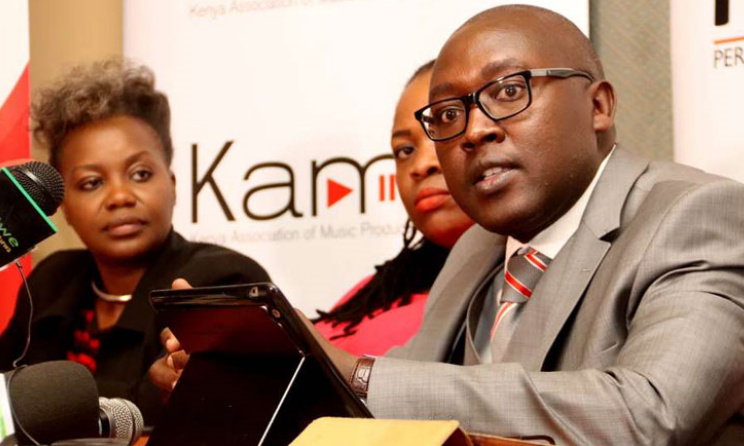Kenyan Copyright Amendment Bill brings new hope
The journey to streamlining Kenyan royalty collection has been long and treacherous. Many hardworking musicians, intellectual property lawyers, policymakers and music enthusiast have dedicated their lives to the struggle.
 MPAKE chairperson Bernard Kioko. Photo: Diana Ngila
MPAKE chairperson Bernard Kioko. Photo: Diana Ngila
And now there seems to be light at the end of the tunnel with the introduction of the Copyright Amendment Bill 2017, which is currently before the National Assembly awaiting a third reading before it is assented into law. Inside the document the hopes and dreams of all who have fought to improve this sector are held. The amendments also reflect the lessons learnt along the way.
Key among the gains expected is the strengthening of the Kenya Copyright Board (KECOBO). Established by Section 3 of the Copyright Act of 2001, KECOBO is mandated to oversee and enforce copyright and related rights. The board is tasked to organise legislation on copyright and conduct training on the same. It is also responsible for licensing and supervising the activities of collective management societies (CMOs), and maintaining an effective databank of authors and their works.
The mismanagement of CMOs has been at the epicentre of the Kenyan royalties debacle for decades. As the oldest CMO in Kenya, the Music Copyright Society of Kenya (MCSK) has been the most controversial body for years. Artists like Poxi Presha, Sauti Sol and Elani have all publicly called out the organisation for mismanagement. Most notable was the #ElaniSpeaks campaign in 2016 when the members of the group came out publically to demand their dues from the MCSK, which sparked a nationwide public outcry.
In February 2017, the MCSK lost the licence to collect music royalties for authors, composers and publishers. KECOBO said in a media statement at the time that officials had reached the decision after MCSK officials had failed to submit their audited financial statements – including royalty payment information – to their members. The Music Publishers Association of Kenya (MPAKE) was then given a licence to collect royalties on behalf of artists instead. What ensued was a series of court cases that lasted the better part of 2017.
“The CMO that lost its licence continued to collect royalties against a court order,” MPAKE chairperson Bernard Kioko told Music In Africa. “The money they have been collecting has of course not been paid to musicians. Additionally, they ‘sponsored’ two members who obtained a court orders stopping MPAKE from collecting. As a result, MPAKE was not able to collect any money until November.”
Although the Kenyan Constitution clearly mandates KECOBO to administer and enforce copyright and related rights in the East African country, its functions have been substantially curtailed by vague legislation. It is this very issue that the new amendments seek to remedy.
To this effect, Section 46D of the drafted bill gives the executive director of the board powers to randomly inspect a CMO’s books and recommend various remedial action should the CMO be found wanting. It also places a penalty not exceeding 200 000 Kenyan shillings ($1 900) or a jail term of no more than three months in the event that a CMO is unable to produce books of account.
Section 46B limits the tenure of CMO chairpersons and Section 46E gives the board extensive powers to remedy a CMO that is found wanting.
The amendments also give members of CMOs more oversight powers to watch over the affairs of an organisations. In the past, membership registration and board meetings were a major source of mischief. Allegations of chairpersons cherry-picking members and farming them out to far-off destinations to pass resolutions that disenfranchise rights holders have been rife for years.
Section 46F seeks to give the board powers to regulate the CMO registration process, annual and special meetings, and approval of distribution rules, among others. These inner workings of CMOs have for a long time been seen as a hindrance to efficient royalty management. The amendments also address takedown notices concerning infringements relating to Internet service providers, conflict-of-interest issues for members of the copyright tribunal, and academic qualifications for directors of CMOs.
Other developments that have injected new hope for royalty management include the introduction of a membership vetting programme. Through its online portal, MPAKE screens its members and gives them a digital platform to monitor payments.
“We do not want ghost members in our registry. That is why we are vetting them. Right holders who work hard and are receiving airplay should be earning appropriately through a scientific distribution. The vetting is part of a bigger plan and we want to get it right from the start,” Kioko said.
Although the introduction of MPAKE to the Kenyan royalties arena may seem to be the answer artists have been waiting for years, there is much that still needs to transpire. The adoption of the Copyright Amendment Bill into law will be just the start – thereon proper governance and accountable transparency will be a must if the new legislation is to function as intended.
Read the full Copyright Amendment Bill below.



























Commentaires
s'identifier or register to post comments